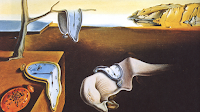The uncertainty of these days makes life feel like a
dream. We drift through the empty streets of the city, floating in an air of unreality.
London’s deserted avenues resemble De Chrico’s depopulated Italian squares,
skirted by forsaken modernist-classical buildings.
One friend spends his days walking through unexplored
areas of London, past unfinished housing developments, redolent of J. G.
Ballard’s Drowned World. His is a
singular expression of our collective pilgrimage - a postmodern Childe Harold; our own peripatetic,
Anglo-Saxon, aboriginal, dreamtime.
Hallucinations and phantasms emerge from our collective
subconscious. We over-react, paranoid, to perceived, unintended, slights or
threats. Time oozes slowly, like the surrealist melting clocks of Dali’s paintings.
And in this altered state of consciousness, our dreams intrude on our waking
day, and our days begin to feel like dreams.
Some turn into nightmares, as the goblins and gremlins of
our internal grimoires connect up
with the objective externalities of unemployment and debt. Here our existence
turns into the hazy atmospherics of A
Scanner Darkly, the 2006 animated film version of Philip K. Dick’s novel.
But from this phantasy, surprising prophetic voices materialise
out of the occultic miasma. One was a guy listening to our open-air service. Slightly inebriated, engaging in conversation
with us, he proceeded to argue himself into Christianity.
The ‘New Atheists’, earlier this century, he claimed, had
tried replacing religion with a secular belief that rational individuals would automatically
do the right thing. But it hadn’t happened. Instead, he maintained, we were had
been left as a society without the values, which only a transcendent source could
supply.
In its place, he suggested, new idols had arisen, with
their own worship: like the weekly applause for the NHS, our present-day
repository for the sacred. But many of these gods proved false. Living for our
careers, now exposed as a hollow shell. Consumption, likewise, revealed as
illusory, with food more important to buy than fashion.
We cycled today around Hackney Wick, the artistic quarter
of East London, surrounded by new building works: a mix of offices, studios,
and residential. Or, at least that was the intention. Who knows whether anyone
will occupy these premises, once they are completed?
The future has been abolished, or at least postponed.
Plans are put on hold. As our days turn into dreams, so our dreams of the
future are deferred, perhaps indefinitely. Franco Berardi, in his book After the Future, had previously argued
that the 2008 recession had resulted in a loss of faith in the future. Covid-19
has deepened this crisis of cultural confidence.
Any constructive corporate project, political or social, has
become impossible, as the future disappears from our horizon of possible
expectations. What matters is survival from day to day. The prospects for this year’s
school and university leavers look grim; recession intersecting with climate change
and global heating.
In a strange amalgam of Buddhism and Christianity, what
Carl Truman termed Zen Calvinism, we
are discovered to be “smoke”, “breath”, “mist”.*
*Ps. 39.5; Ps. 102.5; Jas. 4.14)









No comments:
Post a Comment